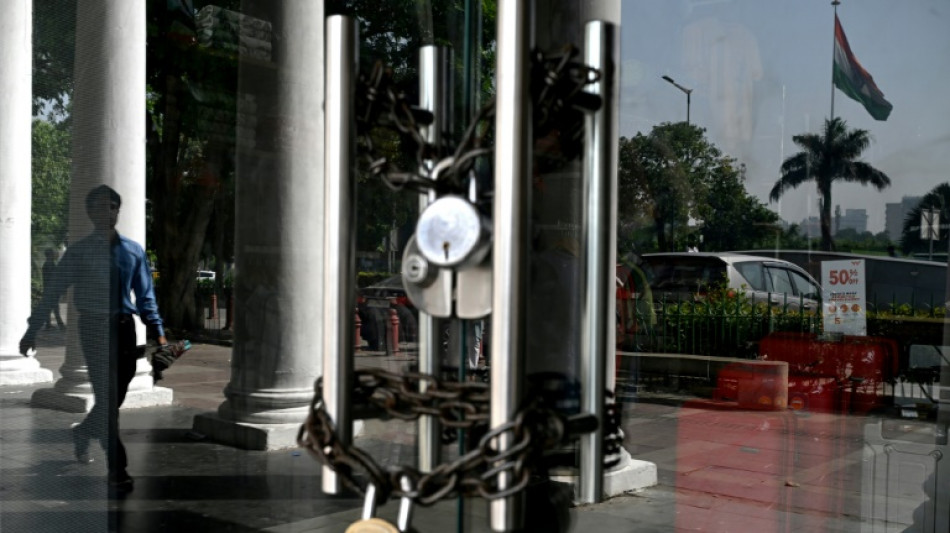
-
 Nawaz sparks Pakistan to five-wicket ODI win over West Indies
Nawaz sparks Pakistan to five-wicket ODI win over West Indies
-
Lions' Norris hospitalized after scary injury, NFL pre-season game suspended

-
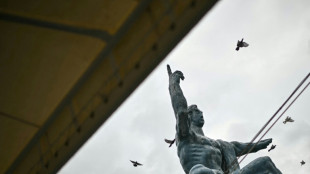 Restored Nagasaki bell rings in 80 years since A-bomb
Restored Nagasaki bell rings in 80 years since A-bomb
-
Putin-Trump summit: what we know so far

-
 Australia settle on Marsh and Head as T20 openers
Australia settle on Marsh and Head as T20 openers
-
New York declares total war on prolific rat population
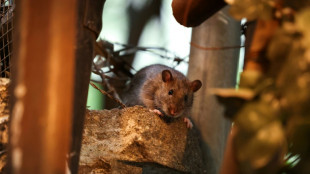
-
 Patriots unveil statue honoring iconic quarterback Tom Brady
Patriots unveil statue honoring iconic quarterback Tom Brady
-
Slot's new-look Liverpool under the spotlight in Community Shield

-
 Five astronauts leave space station for trip back to Earth
Five astronauts leave space station for trip back to Earth
-
Trump and Putin to meet in Alaska next Friday

-
 NBA to open season with blockbuster showdowns: report
NBA to open season with blockbuster showdowns: report
-
Brazil's Lula vetoes parts of environmental 'devastation bill'

-
 Trump says Armenia, Azerbaijan commit to end fighting 'forever'
Trump says Armenia, Azerbaijan commit to end fighting 'forever'
-
Toronto champion Shelton to start Cincy against Argentine outsider

-
 US astronaut Jim Lovell, commander of Apollo 13, dead at 97
US astronaut Jim Lovell, commander of Apollo 13, dead at 97
-
Trump says to meet Putin next Friday in Alaska

-
 Fire extinguished, historic mosque-cathedral in southern Spain 'saved'
Fire extinguished, historic mosque-cathedral in southern Spain 'saved'
-
Trump demands $1bn from University of California over UCLA protests

-
 Fire contained, historic mosque-cathedral in southern Spain 'saved'
Fire contained, historic mosque-cathedral in southern Spain 'saved'
-
US health chief based vaccine cuts on misinformation, researchers say
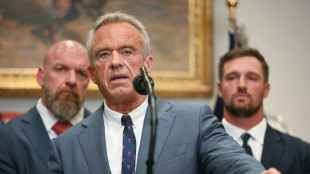
-
 US astronaut Jim Lovell, commander of imperiled Apollo 13, dead at 97
US astronaut Jim Lovell, commander of imperiled Apollo 13, dead at 97
-
Trump says will meet with Putin 'very shortly'

-
 Barcelona reinstate Ter Stegen as captain
Barcelona reinstate Ter Stegen as captain
-
Fleetwood leads St. Jude in search of first US PGA Tour title

-
 Gold futures hit record on US tariff shock; mixed day for stocks
Gold futures hit record on US tariff shock; mixed day for stocks
-
Trump says Armenia, Azerbaijan committed to end fighting 'forever'
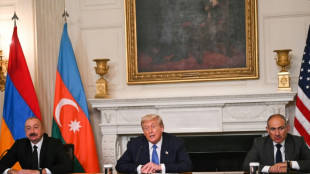
-
 England's injured Woakes still has Ashes hopes
England's injured Woakes still has Ashes hopes
-
US astronaut Jim Lovell, Apollo 13 commander, dead at 97

-
 Swiss gold refining sector stung by US tariffs
Swiss gold refining sector stung by US tariffs
-
New Instagram location sharing feature sparks privacy fears

-
 Spain's Badosa withdraws from US Open
Spain's Badosa withdraws from US Open
-
Mexico seeks compensation from Adidas in cultural appropriation row

-
 NBA Celtics sign Mazzulla to coaching contract extension
NBA Celtics sign Mazzulla to coaching contract extension
-
Swiss gold refining sector hits US tariff mine

-
 Ter Stegen responds after Barcelona strips him of captaincy
Ter Stegen responds after Barcelona strips him of captaincy
-
Chelsea's Broja joins Burnley on five-year deal

-
 Three centurions as 'ruthless' New Zealand pile on runs against Zimbabwe
Three centurions as 'ruthless' New Zealand pile on runs against Zimbabwe
-
Three die in Greece as gales stoke fires, disrupt ferries

-
 ICC unseals Libya war crimes warrant for militia officer
ICC unseals Libya war crimes warrant for militia officer
-
Montreal protagonists Mboko, Osaka out of Cincinnati Open

-
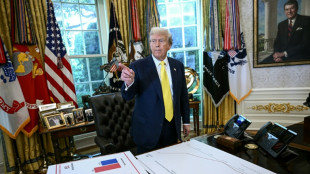 Trump says court halt of tariffs would cause 'Great Depression'
Trump says court halt of tariffs would cause 'Great Depression'
-
Glasner says demotion to Conference League would punish 'innocent' Palace

-
 New Zealand build big total in 2nd Test against Zimbabwe
New Zealand build big total in 2nd Test against Zimbabwe
-
Trump hosts foes Armenia, Azerbaijan in his latest peace initiative

-
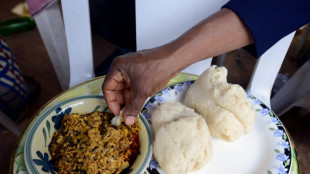 Nigerian scientists await return of Egusi seeds sent to space
Nigerian scientists await return of Egusi seeds sent to space
-
Pioneer spirit drives Swiss solar-powered plane altitude attempt
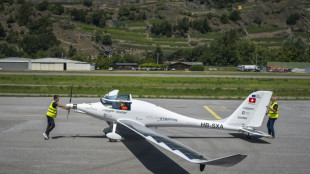
-
 Thyssenkrupp to spin off marine division amid defence boom
Thyssenkrupp to spin off marine division amid defence boom
-
Vance and Lammy talk Gaza, fish as US VP starts UK holiday

-
 Israel plans to 'take control' of Gaza City, sparking wave of criticism
Israel plans to 'take control' of Gaza City, sparking wave of criticism
-
Putin taps key allies ahead of Trump summit, sanctions deadline

| RBGPF | 1.7% | 73.08 | $ | |
| CMSD | 0.25% | 23.58 | $ | |
| JRI | 0.19% | 13.435 | $ | |
| BCC | -1.34% | 82.09 | $ | |
| SCS | -0.76% | 15.88 | $ | |
| NGG | -1.51% | 71.01 | $ | |
| BCE | 2.34% | 24.35 | $ | |
| RIO | 1.76% | 61.86 | $ | |
| SCU | 0% | 12.72 | $ | |
| RELX | -2.2% | 48 | $ | |
| GSK | 0.58% | 37.8 | $ | |
| RYCEF | -0.14% | 14.42 | $ | |
| VOD | 0.88% | 11.36 | $ | |
| BTI | 0.96% | 57.24 | $ | |
| CMSC | 0.39% | 23.05 | $ | |
| AZN | -0.69% | 73.55 | $ | |
| BP | -0.15% | 34.14 | $ |

India and Pakistan's Kashmir fallout hits economy too
Rapidly deteriorating relations between India and Pakistan over a deadly shooting in Kashmir are starting to have small but prickly economic consequences for both nations.
The killing of 26 men on Tuesday in Indian-administered Kashmir, the deadliest attack on civilians in the Himalayan region in a quarter of a century, triggered public outrage across the world's most populous country.
India has unveiled a series of mostly symbolic diplomatic measures against Pakistan, after accusing its regional rival of supporting "cross-border terrorism".
Islamabad, which rejected the allegations, responded Thursday with similar tit-for-tat measures -- but upped the ante by halting trade with New Delhi and closing its airspace to Indian airlines.
Experts say that while the retaliatory moves will not have an immediate or far-reaching impact, it will likely result in longer and more expensive flights for Indians, while forcing Pakistan to increase pharmaceutical imports from other countries.
Pakistan's decision to close its airspace to carriers from its neighbour will see journeys from India to Central Asia, Europe and North America take up to two hours longer.
"We are currently looking at, on average, an extra 60 minutes to 120 minutes for flights depending on where they go," Sanjay Lazar, aviation expert and CEO of Avialaz Consultants, told AFP.
- 'Sabre rattle' -
Pakistan's move is expected to hurt Air India, owned by Indian conglomerate Tata Group, the most.
Air India said that some flights to North America, Europe and the Middle East will have to take an "alternative extended route".
And the extra flying time may eventually make flights more expensive.
"There is extra fuel burn, because you're taking a more circuitous route," Lazar said.
"And if you add an extra stop on the route, then you incur additional crew and landing costs too."
Airfares could rise if restrictions continue beyond six months, though airlines are unlikely to hike up fares immediately to avoid the risk of "not appearing patriotic enough", he added.
Mark D Martin, of Martin Consulting, said ticket prices could rise by more than 35 percent to Middle East destinations and by over 45 percent to Europe.
"It's always the airline business that gets impacted when India and Pakistan spar and sabre rattle," Martin said.
"Let's hope better sense prevails, and this situation deescalates, as this will have an earning impact on airline financials."
Indian government data shows that when Islamabad closed its airspace in 2019 -- after New Delhi hit it with airstrikes in response to an attack in Kashmir -- domestic airlines saw a financial cost of nearly 5.5 billion rupees ($64.3 million) during the nearly five-month-long shutdown.
- Third country trade -
But analysts say Pakistan's decision to halt trade is unlikely to have a major impact, as regular diplomatic flare-ups between the two nations over decades have prevented close economic ties.
India exported less than $450 million in goods to Pakistan between April 2024 and January 2025, a tiny fraction of its overall shipments.
Key items included pharmaceutical products worth over $110 million, and sugar worth over $85 million.
"Imports from Pakistan were negligible -- just $0.42 million, limited to niche items like figs, basil and rosemary herbs," Ajay Srivastava of Global Trade Research Initiative, a New Delhi-based think tank, said in a briefing note.
But Islamabad also said Thursday it had suspended "all trade with India" including "to and from any third country through Pakistan".
It is not immediately clear how this would impact indirect trade through countries such as the United Arab Emirates or Singapore.
Indirect trade is far higher, totalling around $10 billion, according to Srivastava.
"Informal sources say that Pakistan imports several Indian products this way, including chemicals, pharmaceuticals, cotton and yarn," he said.
"On the other hand, India may receive Himalayan pink salt and dry fruits such as dates, apricots, and almonds from Pakistan, also routed through third countries."
D.Khalil--SF-PST
